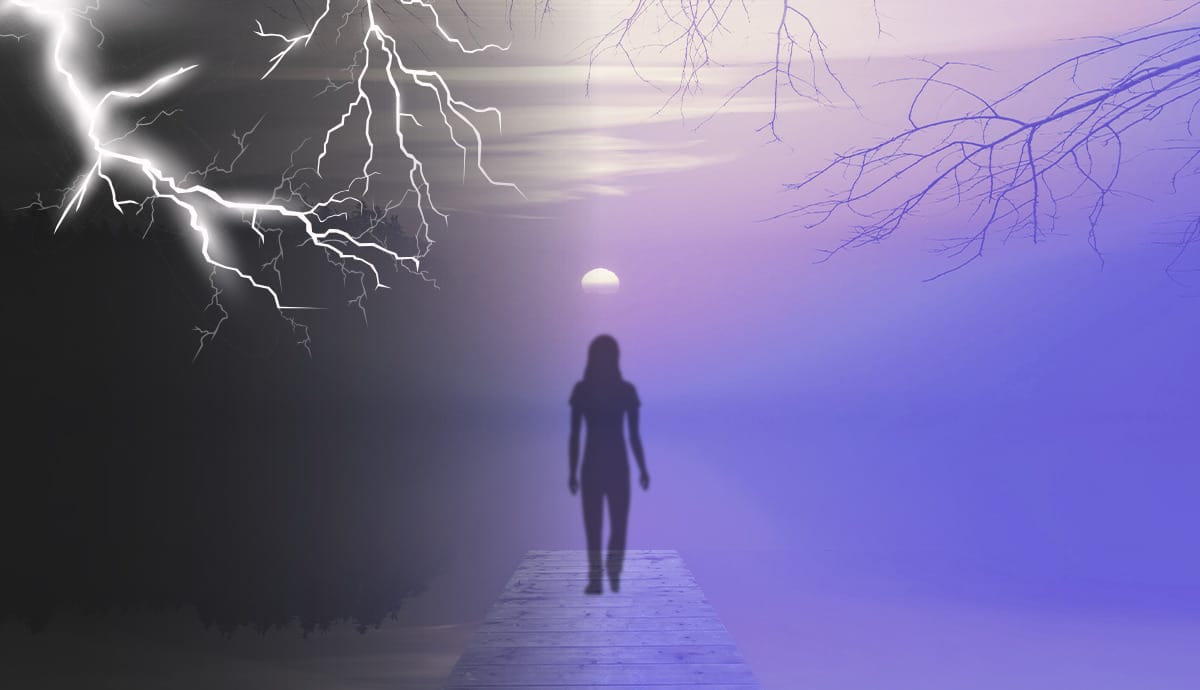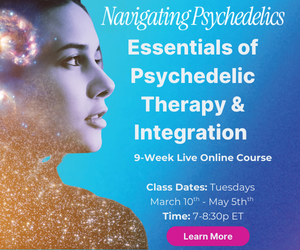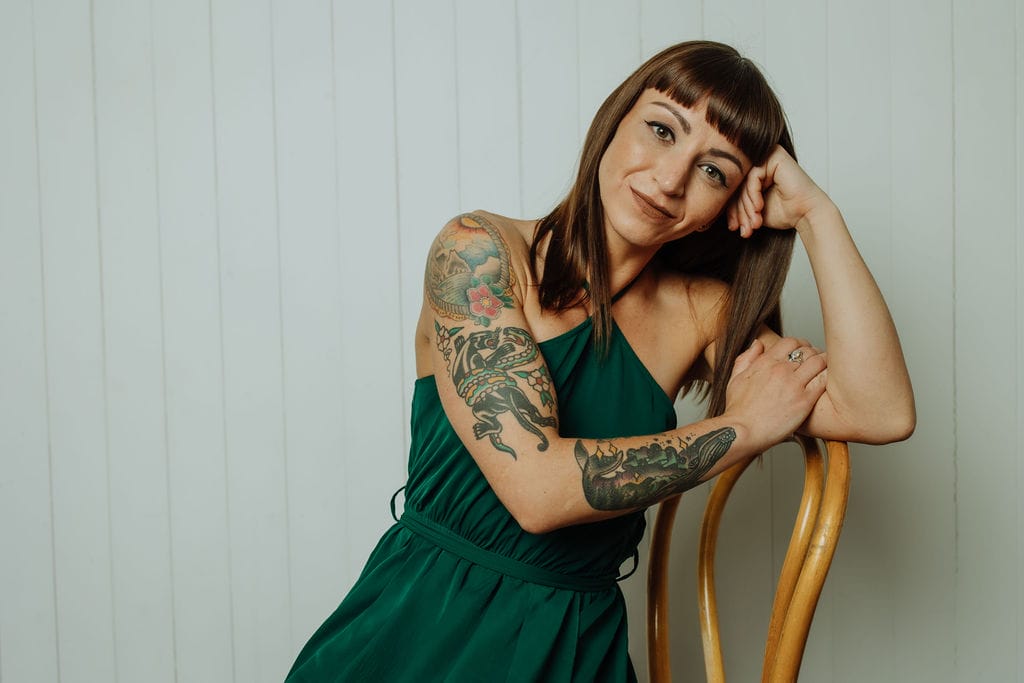In July 2022, a story sent shockwaves through the psychedelic community: an Indiana nurse and mother of five was about to be sentenced to 10 years in prison for growing mushrooms after she’d learned that microdosing psilocybin might improve her 20-year struggle with treatment-resistant depression.
Jessica Thornton (who now goes by Jessica Fitzmaurice) was charged with two felonies: dealing a scheduled substance and child endangerment. After an intervention from Tarin Hale, an Ohio lawyer who eventually became her legal advisor and helped her hire new counsel, she was given a suspended prison sentence and placed on 18 months’ probation with 180 days of house arrest. Eventually, her charges were reduced to a misdemeanor—something she refers to today as “a triumph.”
Two years later, the case is a shining representation of the jarring legal dichotomy in the United States when it comes to psychedelics; one in which a patchwork of county and state laws is in stark contrast with federal regulations that continue to classify psilocybin and other psychedelics as Schedule I substances (this means they possess “a high potential for abuse, no currently accepted medical use in treatment, and a lack of accepted safety for use under medical supervision”).
From within the psychedelic echo chamber, it might feel like psychedelics are widely accepted, but the fact is, psychedelics are illegal in far more jurisdictions than they are not.
Shortly after the story was broken in Psychedelic Spotlight, readers shared their thoughts on Twitter (now known as X), describing the case as “shameful” and “pure insanity.” On a Reddit post in the subreddit r/Indiana, her actions were dubbed a “victimless crime.” Many had choice words for elected officials in Indiana, where psychedelic drug laws have not yet caught up to the sweeping changes that have occurred in other jurisdictions. In neighboring state Michigan, for example, criminal enforcement of the possession and use of psychedelics has been deprioritized in five cities, including Detroit and Ann Arbor.
During her probationary period, Fitzmaurice was unable to speak with the media about her case. For the first time since July 2022, she is breaking her silence. In an exclusive interview, she told Psychedelics Today just how profoundly the case has impacted her life—and how she’s moving forward.
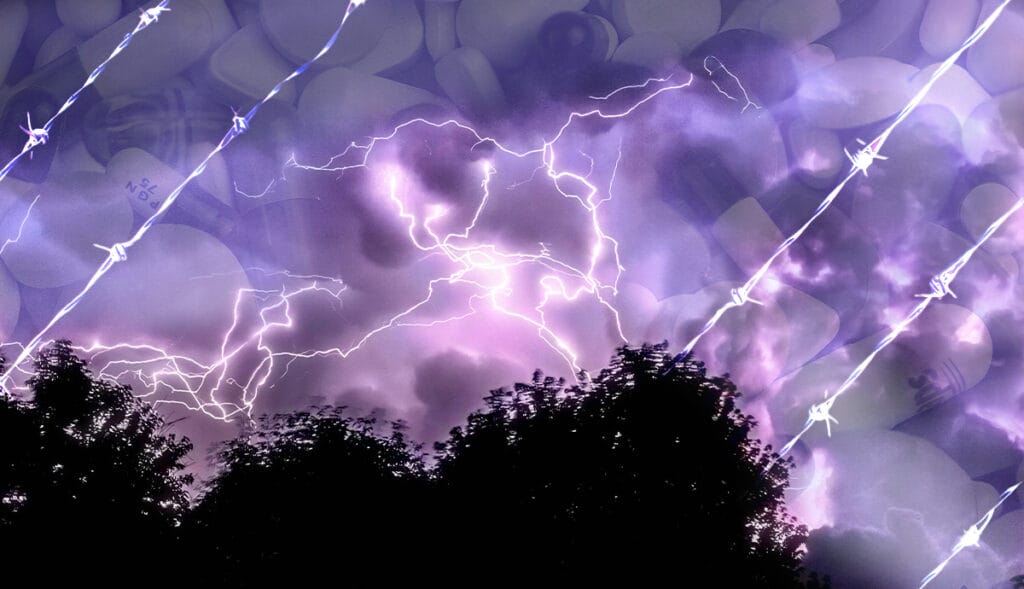
Living with Treatment-Resistant Depression
A neonatal nurse and mother of five, Fitzmaurice did not take the decision to start microdosing psilocybin lightly. After decades of being on a series of antidepressants, in 2022, she says she hit rock bottom.
“I felt like I had gone down every avenue of conventional mental health options. I was on pill after pill with combinations of medications,” Fitzmaurice said. “I was working hard as a travel nurse to support my children. I felt empty, I felt nothingness, and I felt numb. I started having suicidal thoughts and could not accept that there was nothing else out there to help.”
On traditional antidepressants, her feelings and emotions were suppressed, and the side effects that came with them were unbearable.
“I experienced anxiety, trembling, hyperhidrosis, inability to orgasm, numbness of the soul, and diminished creativity and connection with no true love for life. The list goes on,” she explained.
Along with contemplating suicide, Fitzmaurice was regularly having panic attacks and would often break out in hives. Her debilitating struggle with depression deeply impacted her role as a mother.
“I felt as if what I could give wasn’t enough,” she said. “I was not confident in myself. I felt I was out of reach emotionally to my children at times.”
When a friend told her about the success they experienced with microdosing, Fitzmaurice became intrigued. She dove into available research, explored the psilocybin studies being published at Johns Hopkins University, and listened to different podcasts discussing psychedelics.
Several studies indicate psilocybin may very well have antidepressant effects. One 2022 study published in the Journal of Psychopharmacology on the efficacy and safety of psilocybin-assisted treatment for major depressive disorder found that two doses of psilocybin alongside supportive therapy produced “large and stable antidepressant effects” among participants for at least one year following treatment—well beyond the established duration of antidepressant effects reported with ketamine (about two to three weeks).
When it comes to microdosing psilocybin (a practice that involves taking small, sub-perceptual doses of the classic psychedelic regularly to enhance mood or creativity), although there is much hype, the science is largely considered inconclusive as most studies rely on self-reported data. One 2022 study published in Nature compared a group of microdosers to non-microdosers and found, “small to medium-sized improvements in mood and mental health that were generally consistent across gender, age, and presence of mental health concerns.”
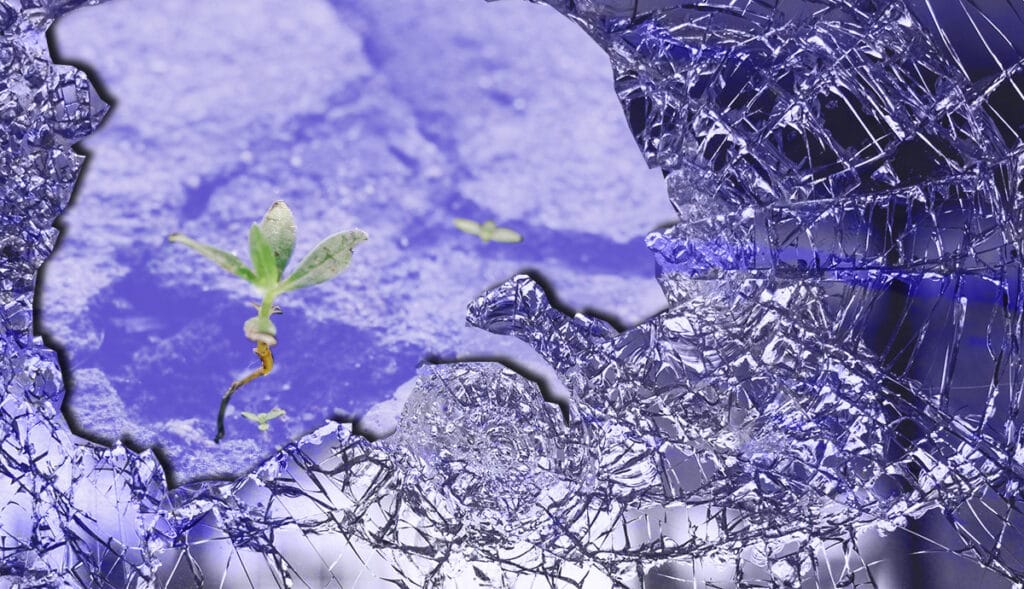
Microdosing Psilocybin Mushrooms: A (Risky) Last Resort
What Fitzmaurice learned was enough to convince her to give microdosing a try. She opted to grow her own mushrooms, assuming the process would be safer than trying to find psilocybin on the street.
“I was so desperate to feel better and the research was so positive that I gave very little thought about the legal implications of growing psilocybin mushrooms for microdosing,” she admitted. “I was only focused on the potential benefits. I believed in the sincerity of what I was doing to save my life.”
After Fitzmaurice started microdosing psilocybin, she began to feel different: for the first time in years, she felt content and confident in her life and body. She felt the emotional weight of work, raising children, and societal standards begin to lift from her shoulders.
“I was able to mentally move on from what had previously held me back. I felt less pressured, less anxious, and actually curious about the possibilities that lie ahead,” she said. “I started doing the things I loved to do.”
She began spending more time with her children, and even became involved in a local mountain biking team, planning trips and adventures with her family. With no intention of stopping, she gave up caffeine and eventually ceased taking her attention deficit disorder medication. Although she didn’t tell them about the microdosing psilocybin until after she was arrested, close family members told Fitzmaurice that they noticed she seemed happier.
Fitzmaurice said she’s embarrassed she wasn’t more aware of the potential legal ramifications of growing psilocybin mushrooms.
“Although I understood that certain mushrooms were illegal, I had no idea that growing mushrooms to treat depression would be seen as a level two felony with a potential prison sentence of 10 to 30 years,” she said.
Courtney Barnes is a partner at Feldman Legal Advisors, where she provides a variety of services to the psychedelic ecosystem, including support with regulatory compliance and risk management. She told Psychedelics Today that Fitzmaurice’s case highlights the ongoing tension between the growing recognition of psychedelics’ potential therapeutic benefits and their strict and outdated classification in the legal system. That blatant conflict continues to put people like Fitzmaurice in a tough spot.
“The varying legal statuses across states lead to confusion, unequal treatment of individuals based on geography, and challenges in creating consistent public health policy,” said Barnes.
“This case underscores the legal risks faced by individuals who, in the absence of legal medical alternatives, turn to psychedelics for self-treatment. It also reflects societal ambivalence, where some see her actions as criminal, while others view them as a necessary and reasonable response to mental health challenges.”
Fitzmaurice said when police came crashing through the front door of her Indiana home to arrest her, her entire world came down along with it. She felt betrayed, violated, hopeless, and misunderstood upon learning she faced prison time and potentially the loss of the custody of her children.
“The most difficult part of facing potential prison time was the fact that I was going to miss out on watching my children grow up,” she said.
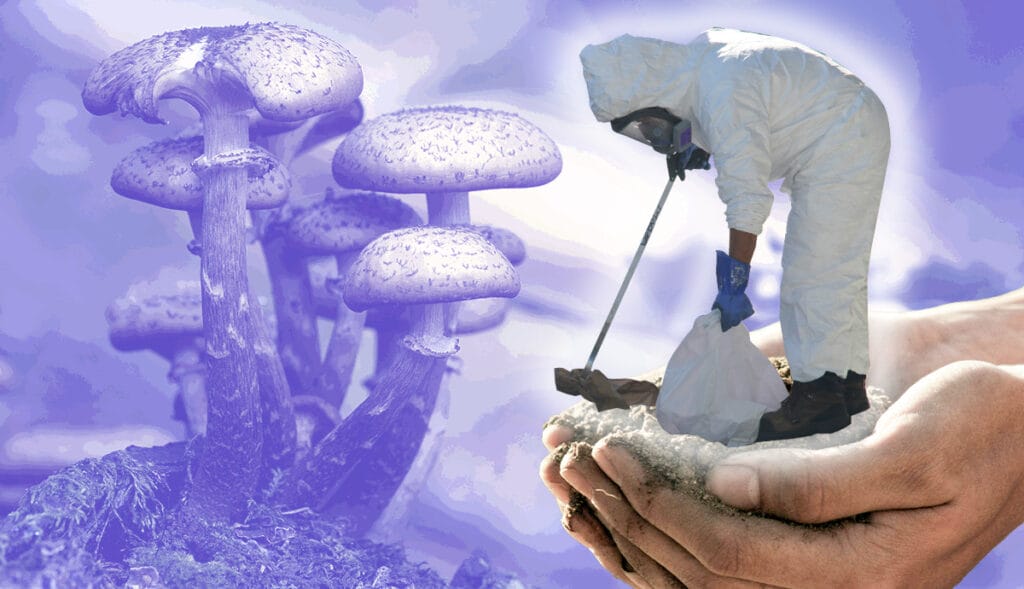
How Jessica Built a New Case
Fitzmaurice’s first lawyer failed to help her build a case, and after requesting several delays in court proceedings, he advised that she plead guilty to the felonies. Feeling she had no other option, she took his advice.
Hale caught wind of her story just two weeks before Fitzmaurice was set to be sentenced. A lawyer with a deep personal connection to and understanding of psychedelics, he was appalled by the case and eager to help. Out of desperation, he reached her through the organizer of a GoFundMe campaign, launched to help cover Fitzmaurice’s legal fees.
“It was basically a done deal, but I had to reach out,” Hale said. “Here’s a woman who is 40 years old, with 20 years of documented anxiety and depression untreated by pharmaceuticals, thrown into this situation and she was scared, so she took the deal.”
When they finally spoke by phone, Fitzmaurice had already given up hope and was preparing to spend the next 10 years of her life in prison. After several conversations and with Hale’s help, she fired her lawyer and hired a new attorney, Andrew Maternowski.
Hale said he knew that whoever represented Fitzmaurice would have to provide the prosecutor with some education on the safety and efficacy of microdosing psilocybin, and a better understanding of why she was growing mushrooms.
“When they arrested her, they came in wearing hazmat suits to avoid breathing the spores, which they thought would intoxicate them, so it was like starting from scratch,” he said.
Since her previous lawyer had failed to explain why Fitzmaurice was growing mushrooms, “the prosecutor thought she was this major drug dealer poisoning kids,” something they would have to change his mind on.
Together, Maternowski and Hale built a new case with letters of support from several experts, including researcher and author Jim Fadiman, psychologist and professor Dr. Alan Davis, psychiatric nurse practitioner Andrew Penn, and author and psychiatric nurse practitioner CJ Spotswood. The letters helped convince the prosecutor that Fitzmaurice was not a drug dealer, and Maternowski negotiated a plea agreement that would reduce the charge from trafficking to possession; from 10 years in prison to three months of house arrest and 18 months of probation. The judge later reduced the charge to a misdemeanor.

Legal Implications and Potential Reforms: Education is ‘Paramount’
Fitzmaurice’s case could have a nuanced influence on future prosecutions and defenses related to the use of Schedule I substances for personal medicinal use in the United States, according to Barnes.
“The fact that the prosecutor reduced the charges after reviewing her case and expert testimony indicates a recognition of the complexities involved in cases where individuals use Schedule I substances like psilocybin for self-treatment,” she said, adding that this outcome might encourage defense attorneys in future cases to present similar arguments.
Barnes also said the reduction in charges and comparatively lenient sentence could serve as a signal to both prosecutors and judges that, under certain circumstances, harsher penalties might not be warranted.
Several different approaches to drug policy reform could help prevent cases like this one from happening again, according to Barnes, who suggested that decriminalization of possession, production, and use of psychedelics could reduce the burden on the criminal justice system and allow more resources to be allocated toward public health approaches. Pairing decriminalization with legal access pathways, such as Colorado’s Natural Medicine Health Act, “is also a wise approach,” said Barnes.
At the federal level, she suggested that the reclassification of psilocybin and other psychedelics from Schedule I to a less restrictive schedule, “would more appropriately reflect [their] medical use in treatment in the U.S. and could reduce the severity of criminal penalties for use and possession.”
As more people turn to psychedelics and practices like microdosing psilocybin for their mental health, Barnes noted that although it is sparsely reported, there has been an increase in law enforcement seizures of psilocybin mushrooms.
“The growing public awareness about the potential benefits of psychedelics has resulted in a surge of people seeking out these substances,” said Barnes. “There have been a handful of reports indicating that arrests for psilocybin have increased over the past several years, likely, at least in part, resulting from an increase in demand for it.”
Barnes has also noticed an increase in regulatory confusion, especially in states like California, where an unregulated psychedelic market is currently thriving. She said the number of times she’s heard people confidently state psilocybin is legal there is “alarming.”
“There are harsh penalties for psilocybin possession in California, even if the law is sporadically enforced,” said Barnes. “As more localities and states adopt policy reform in a patchwork, the more likely it is for people to misunderstand the laws that apply to them. Public education is paramount here.”

How Jessica—and the State of Indiana—are Moving Forward
Despite the immense loss she has experienced, Fitzmaurice looks forward with a sense of hope. “I lost so many important aspects of my life: my children, my job, my career, and even my community, my hometown. Now’s the time to start rebuilding all of that.”
Now living in Arkansas, Fitzmaurice is committed to sharing her story with others and conveying the need for drug policy reform, especially in states like Indiana. As a recipient of a Psychedelics Today Vital psychedelic training program scholarship, she is eager to put her knowledge of and experience with psychedelics to use as a nurse. She intends to go back to school to become a psychiatric nurse practitioner so she can work with psychedelics in a legal manner. She is currently assisting at a ketamine-assisted therapy clinic and plays an active role in Decriminalize Nature Northwest Arkansas.
To help treat her depression, Fitzmaurice underwent ketamine-assisted psychotherapy and said with preparation, integration, and community support, she now has many tools that help her work through her trauma, “with a positive mindset.”
“The contemporary mental health treatment model may work for some people, and that’s fantastic. It doesn’t work for everyone, including me,” said Fitzmaurice. “I didn’t realize how badly we, as a global unit, were in a mental health crisis. Psychedelics opened my eyes to this and now, the nurse in me just wants to help.”
Since Fitzmaurice’s case made headlines in 2022, the legal status of psilocybin in Indiana remains unchanged—but that doesn’t mean Indiana lawmakers are ignoring it.
In March 2024, Indiana Governor Eric Holcomb signed a psilocybin research funding bill with a focus on veterans and first responders. Fitzmaurice called it “a great introduction” and said she’s hopeful psychedelics might soon be destigmatized in her home state, but said it’s unlikely the law will change in Indiana unless psilocybin is rescheduled at the federal level.
“People shouldn’t have to risk losing their life to prison for trying to care for their own mental health,” said Fitzmaurice. “These medicines need to be decriminalized or rescheduled at the very least. Humanity should not be punished for prioritizing mental health.”
